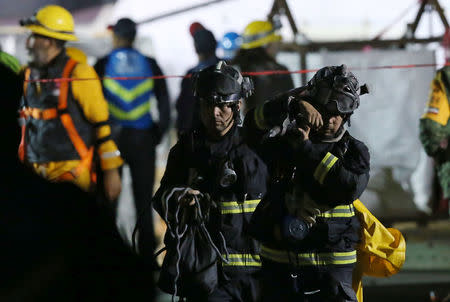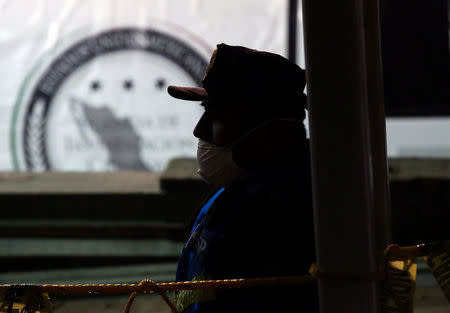Cuts hurt Mexico quake response, outlook ahead of 2018 vote
By Gabriel Stargardter MEXICO CITY (Reuters) - Spending cuts and a failure by Mexico's president to upgrade an earthquake alert system hurt life-saving prevention programs and amplified recovery costs after two major temblors this month, current and former government officials said. Although President Enrique Pena Nieto is eager to show a prompt and competent response to the earthquakes, which killed more than 430 people, the budget of recovery agencies is threadbare due to cost-cutting by his administration. Pena Nieto, an unpopular centrist struggling to get a successor from his party elected president next July, on Wednesday acknowledged the problem, urging lawmakers to boost funding in the 2018 budget. "The reconstruction needs more resources," he said. The government has slashed disaster budgets by as much as 50 percent in recent years, part of a broader cost-cutting effort to make up for shortfalls caused by a drop in oil revenues, which finance about 20 percent of Mexico's federal budget. The 2017 budget alone reduced funding for Mexico's various disaster and civil protection efforts by 25 percent, from about 8.6 billion pesos ($475 million) in 2016 to 6.4 billion pesos. The cuts last year prompted lawmakers to warn in a report that "the state is relinquishing its responsibilities to its population, given inevitable and unknowable disaster risks." Now, after the two big quakes, and damage from hurricanes before that, Mexico is hard-pressed to find ways to rebuild. "The reconstruction fund has zero pesos," Luis Felipe Puente, the government's emergency services chief, said in an interview. For those who work in readiness efforts, the current problem is a clear example of what happens when governments skimp on prevention measures, from risk assessments to early warning systems for quakes, volcanic activity and other disasters. According to the United Nations, every dollar spent on preparedness saves about seven dollars in response. In 2014, Mexico's federal auditor chastised the government for spending more on reconstruction than on preparing for disasters. "We should be investing more in prevention," said Enrique Guevara, a former head of Mexico's National Center for Disaster Prevention, or CENAPRED. "Firstly because you save lives, and secondly you save money." "OLYMPIC SILENCE" At CENAPRED, founded in the wake of a massive 1985 quake that killed thousands, expenditure fell by 20 percent between 2012 and 2016, hurting the upkeep of a national risk atlas and lowering morale at the institution, according to a senior official there who requested anonymity to speak frankly. Pena Nieto also slashed 2017 budgets for two government funds that finance disaster efforts, official data shows. This year's budget for FOPREDEN, a fund for the prevention of natural disasters, was cut by 50 percent. FONDEN, a larger fund for disaster relief, lost a quarter of its budget, according to the government spending plan. In addition to reducing funds for the federal government's own efforts, the president has turned down or ignored financing requests at other programs that officials said could help lower disaster tolls. Unlike the previous administration of former President Felipe Calderon, Pena Nieto has not invested in a widely praised earthquake alert system credited with saving lives since it was implemented in Mexico City in 1989. The system, the Center for Seismic Instrumentation and Registry, detects many quakes across the country, sounding a warning that gives Mexico City's roughly 20 million residents crucial time to evacuate buildings before some tremors arrive. Funded mostly by the city government, and currently operating on less than 30 million pesos per year, the system needs more monitors to detect even more temblors, like the 7.1 quake on Sept. 19. Better detection, the system's director said, could have given Mexico City residents up to 5 seconds more warning that day. As it happened, many locals said they heard the alarm only once the ground began shaking. But repeated requests to Pena Nieto and various federal agencies in recent years were met with "Olympic silence," said Juan Manuel Espinosa, the director. A government spokesman did not respond to a request for comment. "NO MONEY FOR ANYTHING" For Pena Nieto and his Institutional Revolutionary Party, or PRI, the lack of funding could create problems at the ballot box, especially among a Mexican electorate that is increasingly ready for change after years of corruption and drug violence. Although Pena Nieto cannot stand for reelection, the PRI ranks third in current projections for the July vote. Meanwhile, rivals like leftist frontrunner and former Mexico City Mayor Andres Manuel Lopez Obrador are poised to take advantage of any missteps. "Whoever gets this wrong will feel the effects in the election," said Gustavo Mohar, a former Mexican intelligence official who now runs a strategic risk consultancy. For the recovery to succeed, the government must find additional sources of financing. Estimates of the cost range from about $2 billion, according to the government, to as much as $4 billion, a calculation by investment bank Nomura. Puente, the emergency services chief, said the finance ministry may receive funding from catastrophe bonds, issued by the World Bank in August, that could provide Mexico with up to $360 million in protection from certain quakes and storms. But aside from housing the homeless and rebuilding, the government must also ensure it spends disaster funds wisely and transparently - a notoriously tricky task, particularly for an administration that many Mexicans consider corrupt. In the hard-hit capital, where at least 204 people died, volunteers helping with recovery work this week said they distrust the government's ability to provide effective relief. "There is no money for anything," said Beatriz Navarrete, a 21-year-old medical student manning a donations tent. "If the government was really spending money, we wouldn't be here, begging for medicine." $1 = 18.1 Mexican pesos. (Reporting by Gabriel Stargardter; Additional reporting by Dan Trotta. Editing by Paulo Prada.)

 Yahoo News
Yahoo News 


